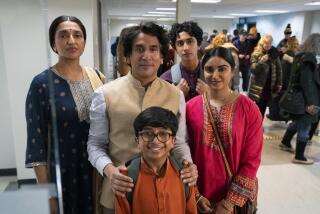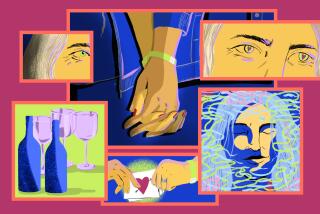Commentary: What Netflix’s ‘Indian Matchmaking’ doesn’t tell you about arranged marriage
They say you never forget your first time.
I was in the middle of an editorial meeting at the newspaper I worked for in 2005 when it came out of nowhere: an overwhelming sense of fear, the trembling hands, the absolute certainty that my heart was going to burst out of my chest. Even today, I can hear the cacophony of the newsroom around me as I gathered that no, I wasn’t dying. It would be years before I understood that what I had experienced that day — and would on three subsequent occasions — was a panic attack.
I was 24, and just two hours before, my parents had called to ask me to be home on time that night. They wanted to discuss a “match” with me.
So I greeted the arrival of Netflix’s “Indian Matchmaking” last month with a half-raised eyebrow and a smirk. I had no intention of watching it. I had been there, done that, gotten the T-shirt and made a bonfire from it.
‘Indian Matchmaking’ joins Netflix’s growing stable of dating shows like ‘Love Is Blind’ and ‘Too Hot to Handle’ while taking on arranged marriage stereotypes.
Always a subject of curiosity in the West, tempered with a generous helping of disbelief, “arranged marriage” — a facilitated match between two individuals from the same economic and social demographic — is not a uniquely Indian or South Asian phenomenon. It is a practice that is followed in several Middle Eastern countries, Japan and Turkey, among others. “Indian Matchmaking,” however, isn’t here to delve into the history of the phenomenon or its current expressions. It’d rather you sit back with popcorn and guffaw your way through every awkward encounter and groan at every demanding parent.
I was 23 when my parents started looking for a “suitable” match for me, a decision made without my views being sought. “The final choice will always be yours,” I was told reassuringly as more and more eligible men, all from the same religious community and caste as mine, started making weekend appearances in my parents’ living room. Almost all of them boasted of two to three degrees, similarly well-educated siblings and fathers in “senior” positions in either the government or the private sector. (Aparna’s mum, in “Indian Matchmaking,” would have approved.)
They all came recommended through friends and family, that larger collective that works very hard to bring together not two individuals but two families — mirror images of one another, both wearing a thick cloak of respectability going back generations — into a union, under the guise of pragmatism, that promotes caste and economic hegemony. Vyasar, as he worries throughout the show, would have indeed found the going very tough.
I wouldn’t say that all my encounters in the arranged marriage setup were terrible, but most were. Matchmaker Sima Taparia’s favorite word, “compromise,” was repeated to me so many times that people around me may as well have been chanting it as a mantra. What did I mean I was uncomfortable with the questions he asked? I should give him the benefit of doubt: marriage is a compromise. What did I mean I wasn’t willing to move countries after getting married? After all, marriage is about compromise.
Everyone wanted a professionally qualified bride but not a career-oriented one. My double-barrel literature degrees and an unconventional professional choice were square edges on a round peg that most families did not quite know what to do with.
For me, the arranged marriage system compounded the sense of entitlement that many Indian men and their families feel, in which women are theirs to pick and choose from. Our height, our complexion, our weight: Everything is up for scrutiny. Choice is an illusion, and saying no when there is no discernible reason to say so (and there almost always isn’t) will only get you branded as difficult and demanding.
It was rather ironic then, that my sympathies lay the most with the two characters in “Indian Matchmaking” who come off as the least in need of it — jewelry designer Pradhyuman and businessman Akshay. Their conversations with their siblings and family members where they are in turn mocked, questioned over their reluctance and all but charged with being bad children because of the stress their pickiness causes their parents struck a deep chord. In them, I recognized so many of us who are in the system but not ready to get married just because biology and a mind-boggling belief in the concept of “the right time” dictates it.
At one point in the series, Akshay tries to articulate this when he says that his family is unhappy right now, but that if he marries the wrong person, they will all be unhappy forever. Similarly, Aparna’s mother’s backstory touches on this oh-so-fleetingly when she says she was “forced” to get married at age 19.
Did Akshay get married? Did Aparna find love? We checked in with the “Indian Matchmaking” participants to see if any pairings are still intact.
But “Indian Matchmaking” chooses not to focus on the emotional and psychological pressure the process puts you under. It does not show you the hurt and bewilderment of twentysomethings faced with monosyllabic dinner conversations and disapproval so intense that you can spend weeks fretting over how to break the news of a friend’s upcoming wedding to your parents. Instead, the series mines Preeti’s almost teary-eyed description of her desire to see her son Akshay married — without mentioning that parents too face extreme pressure within the system to launch a frenzied search for a partner for their child.
It all makes for a toxic cocktail, one that in my case took loving, supportive parents and turned them into grim-faced strangers overnight. It also led to a disastrous engagement in 2006, marked by emotional abuse — the ending of which required mining my deepest reserves of courage. Still, it was a turning point for me with regard to the system: I was able to sit across the table from my parents and tell them, “Enough.” And for every woman like me who can stand up and defy an arranged marriage, there are many who can’t, for reasons beyond their control — beginning with economic hardships.
Irked by the memes and jokes that started appearing about “Indian Matchmaking” within days of its premiere, I started a Twitter thread detailing my experiences in the system. I have since been inundated with messages from women across cultures and countries sharing their experiences.
Perhaps they felt compelled to reach out exactly because “Indian Matchmaking” isn’t interested in answering tough questions about the arranged marriage system. It will not show you how Akshay called off the engagement, besieged by doubts — or what his former fiancée felt about it. At the end of the day, it’s a reality show where excesses are amplified to evoke a reaction from the viewer. Our collective clamoring to find out if any of the participants ended up with the partners we last saw them with is simply an indication of society’s obsession with happily ever afters, no matter the route we take to arrive at it. But beyond the glossy facade lies real heartbreak — and memes, jokes and binge-watches shouldn’t cloud our sight of that.
More to Read
The complete guide to home viewing
Get Screen Gab for everything about the TV shows and streaming movies everyone’s talking about.
You may occasionally receive promotional content from the Los Angeles Times.






